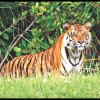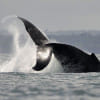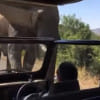A treat in wildlife

A bend in the river and a wooden pyre came into view. About 15 feet above the water, there was a nice round cubicle in the front and you climb directly on to it. This is Sutarkhali forest station.
Once on the ground, Reza Khan busied himself with his video camera. He wanted to capture the activities of the red fiddler crabs. These are some funny creatures with one arm a massive pincer and the other just some stick like legs. We watched the crabs fight each other for nothing. They had all the mud ground to themselves and yet they had to go after one another for territorial right. And there was this huge crab being chased by a female. It was somewhat puzzling because the male had no reason to retreat and yet it jumped into a small puddle of water to save its life. Perhaps it was injured or too old to defend itself, Reza Khan told us.
It seemed there was something funny in Sutarkhali. Everybody was in a fighting mood. Two big mudskippers were in a face-to-face brawl. They flapped their legs and tried to bite each other's heads off. It was a strange scene. And then the biggest fight of all awaited us beside a pond. There were some wild fluttering and loud squawking in the coconut trees and bright red and yellow flashed. Two flame-backed woodpeckers were locked in a bloody fight. They were brutally pecking at each other and then fell into the pond. The definitive winner had grabbed the neck of the other woodpecker in a deadly lock and tried to drown it. The loser bird flapped wildly, it knew death was only seconds away.
As our cameras clicked away documenting this amazing show, Siraj could not hold himself any more and wanted to save the dying bird.
Read all articles of "Looking for the Temple Tiger" series
"Don't do it," Reza Khan said without taking his eye off his video camera. "This is the rule of nature. One bird will kill the other today."
We watched with heart-stopping anxiety. Moments passed. Suddenly the defeated bird wrenched itself free from the death grab and swam to the shore. And then it flapped off to a branch, took a moment's rest and then flew beyond the trees.
"Saved for today," Reza Khan whistled. "That was a good lesson for the bird. It would not come into confrontation with the winner again."
Sutarkhali station, as we found out, is an interesting place on the fringe of the forest. You don't have much free range to go, as it happens everywhere in Sundarbans except Kotka and Kochikhali. You are basically river locked here on small landmasses. But this is quite a place for bird watching we found about ten species including scarlet minivet, collared kingfisher and iora.
It was getting too hot and humid now and we were sagging fast. Time to go back to ship. While we had lunch under the cloudless sky on the deck, the sudden hot breeze felt like the puffs of a dying dragon. The ship started sailing again and soon we were on the Vadra river. Here the keora trees were taller and greener like they had put on new leaves, lucent and luscious. We anchored in the middle of the river and took the small engine boat out. Very slowly we chugged along the river close to the bank. All our eyes were fixed on the forest in search of wildlife.
First, we found a group of monkeys. They ogled at us as we took snaps. One of them tossed a fruit sportingly. And a big male became so frustrated at our sight and he yelled coarsely and jumped up and down on a branch. After that there was not anything of much interest. Just the common kingfishers and herons. We cruised very slowly and left the river to enter the canals that have spread like cobwebs. The waterways have narrowed down here and the reflections of the golpata and Keora tress did not make us feel any better. It was now extremely humid and hot and the sun was beating down mercilessly. Just when we were feeling dizzy, we struck a goldmine in the form of a ruddy kingfisher.
This beautiful reddish bird is a rare sight because of its reclusive nature. And here was one just about 20 feet away. We stopped the engine and approached it quietly, filming it all the way. Strangely, the bird did not fly away and we reached within six feet of it. Then we knew why it was so callous it was a juvenile bird and was still unaware of the dangers that humans pose. We took all the time to document the bird and then came back.
On the way we saw two eagles a serpent eagle and other a grey-headed eagle. It was about evening and in the sylvan shadows we were travelling in the boat. In the distance we noticed a tiny black something coming our way. A bit closer and we knew it was fishermen's boat. The sun-baked figures were rowing fast because they wanted to cast the net before it was dark.
The new noticed something moving the water a big black cobra. It was crossing the river and we followed it to the bank. The cobra took a look at us and glided swiftly away, its beautiful black body glinting in the sun. It got on a tree and tried to hide itself, lying flat and looking at us with its innocent black eyes. Some villagers standing on the bank also noticed the snake and came with sticks to kill it. We told them not to harm the reptile as it was not going to get into the village. It would just live by the bank, feeding on fish.
We left the snake to its fate, hoping it would live its day and approached our ship moored in the distance like a white swan. We were gelatinous from the day's heat and exertion. And the lights of the ship looked like beacons of bliss.

 For all latest news, follow The Daily Star's Google News channel.
For all latest news, follow The Daily Star's Google News channel. 








Comments